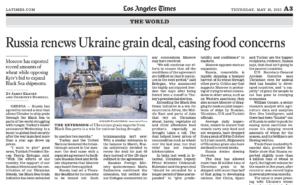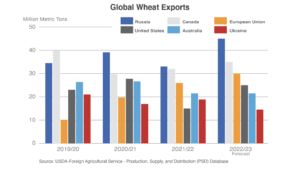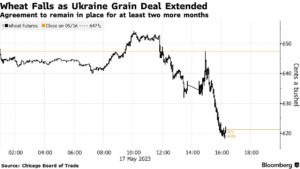A prolonged military conflict in the Middle East could potentially upend key commodity markets due to Iran’s control of the Strait of Hormuz, one of the world’s most important trade…
Black Sea Grain Deal Extended for Two Months
Matthew Mpoke Bigg and Gulsin Harman reported in today’s New York Times that, “Ukraine and Russia agreed Wednesday to a two-month extension of a wartime deal that allows Ukraine to ship its grain across the Black Sea, a rare example of cooperation between the two countries.
“The agreement was scheduled to expire on Thursday. While both sides expressed ongoing grievances over the issue of exports, reaching agreement appeared to offer advantages for governments in both Kyiv and Moscow, as well as for President Recep Tayyip Erdogan of Turkey, who acted as broker along with the United Nations.”
Today’s article noted that, “Ukraine has complained in recent weeks that Russia has prevented required inspections of Black Sea shipments and refused to approve the use of more vessels.
“Ukraine’s infrastructure minister, Oleksandr Kubrakov, said in a Facebook post that despite the extension until July 18, more work needed to be done to address shipment delays that he blamed on Russian ‘sabotage.’
“‘We hope that our partners will do their best to get the grain deal to fully work for the world’s food security and that Russia will eventually stop using food as a weapon and blackmail,’ he wrote.”
I welcome the confirmation by the Russian Federation to continue its participation in the Black Sea Initiative for another 60 days.
— António Guterres (@antonioguterres) May 17, 2023
Even in the darkest hours, there is always a beacon of hope & an opportunity to find solutions that benefit everyone.
Bigg and Harman added that, “More than 30 million tons of food have been shipped under the Black Sea Initiative, according to data from the United Nations. The original deal was extended in October and again in March, but the last renewal was for just 60 days, half the 120 days sought by Turkey, Ukraine and the United Nations.”
Associated Press writers Jamey Keaton and Courtney Bonnel reported in today’s Los Angeles Times that, “Russian Foreign Ministry spokeswoman Maria Zakharova confirmed the extension, but neither she nor Erdogan commented on any concessions Moscow may have received.

“‘We will continue our efforts to ensure that all the conditions of the agreement are fulfilled so that it continues in the next period,’ said Erdogan, who announced the highly anticipated decision two days after being forced into a runoff in Turkey’s presidential election.
“Extending the Black Sea Grain Initiative is a win for countries in Africa, the Middle East and parts of Asia that rely on Ukrainian wheat, barley, vegetable oil and other affordable food products, especially as drought takes a toll. The deal helped lower prices of commodities such as wheat over the last year, but that relief has not reached kitchen tables.”
#Russia has said it will remain part of the Black Sea Initiative which has allowed 30m tonnes of grain to be exported from #Ukraine. UN chief @antonioguterres said it was 'good news for the world'https://t.co/Ij1ixn1klk
— UN News (@UN_News_Centre) May 17, 2023
The AP article pointed out that, “Trade flows tracked by financial data provider Refinitiv show that Russia exported slightly more than 4 million tons of wheat in April, the highest volume for the month in five years, after record or near-record highs in several previous months.

“The issue is more pressing with Ukraine’s wheat harvest coming up in June and the need to sell that crop in July.”
We welcome news from the @UN and Türkiye on the extension of the Black Sea Grain Initiative. We urge Russia to fully comply with and expand the deal so that food remains accessible and affordable for people across the globe. pic.twitter.com/wit7oujtXp
— Department of State (@StateDept) May 17, 2023
Bloomberg writers Selcan Hacaoglu, Aine Quinn and Megan Durisin reported yesterday that, “A deal allowing Ukraine to export crops from key ports via the Black Sea will be extended by two months, a relatively short time frame that leaves open the question of what happens beyond that period.”
The article noted that, “Wheat futures slumped 4.4% by 4:42 p.m. in London. Corn, the top commodity shipped under the initiative, declined 3.9%.

“While an extension keeps the agreement alive for now, dysfunction among the parties has blunted its effectiveness. Ukraine has said Moscow is purposefully slowing the pace of exports, and the shipment corridor through the Black Sea is now nearly empty, with no inbound vessels cleared since early May.”
Couldn't agree more w/ @StateDeputySPOX: “The world needs the Black Sea Grain Initiative. What’s more, the world needs Russia to end its illegal war against Ukraine, which would allow farmers to return to their fields, return agricultural trade to normal, and immediately and…
— Ambassador Bridget A. Brink (@USAmbKyiv) May 18, 2023
Dow Jones writer Kirk Maltais reported yesterday that, “Confirmation throughout the day of a fresh 60-day extension for the Black Sea export corridor put pressure on the CBOT grains complex, with wheat catching most of the selling.”
And Reuters writerNigel Hunt reported today that, “Chicago wheat futures fell to a two-week low on Thursday as an extension of a deal to allow war-ravaged Ukraine to continue exporting grains through Black Sea ports eased concerns over world supplies.
“Corn and soybean prices were also lower as favourable weather helped newly planted crops in the Midwest.”





